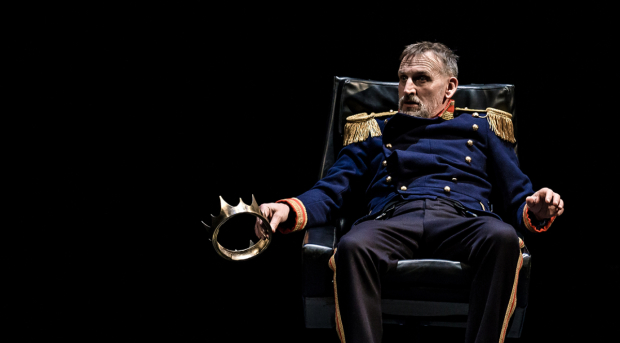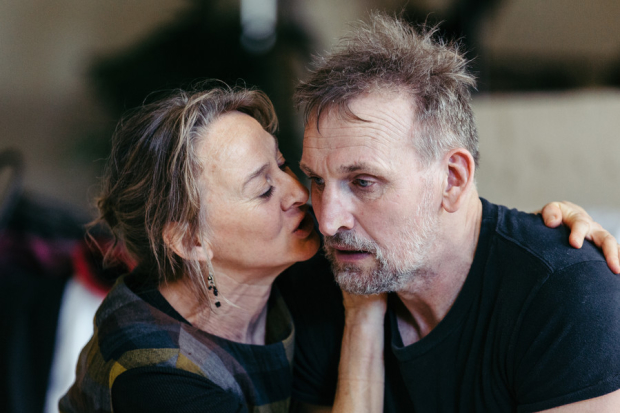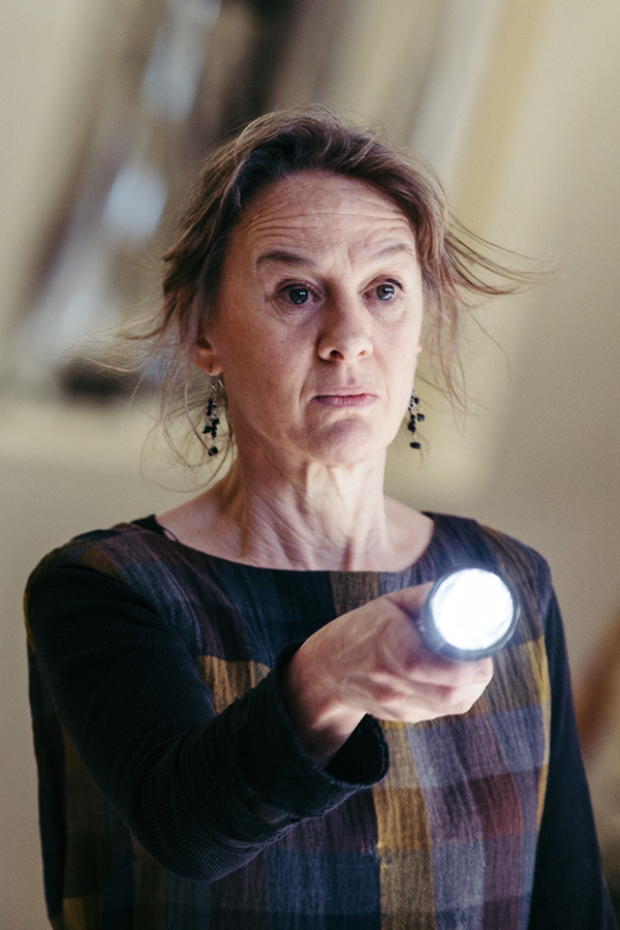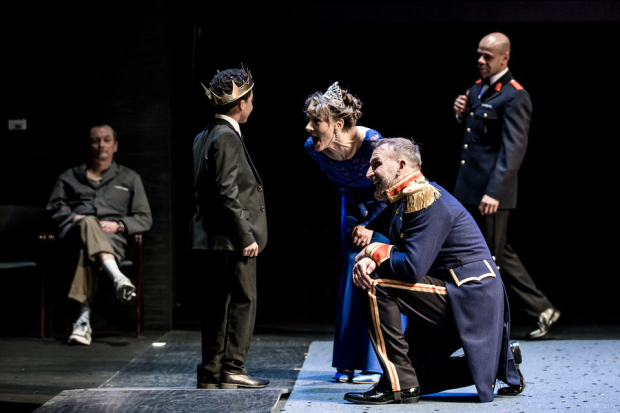Did the critics see red over the RSC's Macbeth?

© RSC, Richard Davenport
Sarah Crompton, WhatsOnStage
★★
"Eccleston has always wanted to play Macbeth and there is something really interesting about his ultra-macho soldier, who rolls and swaggers around the stage, confident in his world. When he assumes the crown, he sprawls in the black leather chair that serves as a throne, knowing how to take control and how to rule."
"Noticing the play's obsession with time, and the way it stops for the Macbeths after they have slaughtered Duncan, Findlay sets centre stage a red-faced digital clock that counts down from that moment to Macbeth's own death. In a smart end note, at the close, it starts again, as she suggests the circularity of the thirst for power. Huge projected quotes and words in capital letters "LATER" "FIFE" "NOW" are flashed up on the back wall, like slogans, to make her point."
"Even the witches are children, three moppets in pink polka dot pyjamas and white pompom boots, who clutch bloody dolls and talk in unison. They clearly owe a debt to the twins in The Shining and the red-coated figure in Don't Look Now. The vibe is generally horror. But that's my problem with it. If Macbeth is just a horror story, then it isn't a particularly good one; to strip it of its feeling, its equivocal moral sense is to reduce it so far it is hardly worth performing."
Natasha Tripney, The Stage
★★★★
"Though the production is often very far from subtle – Lizzie Powell’s lighting fizzes and flickers and there are bits of Rupert Cross’ score that would not feel out of place in one of the Insidious films – it doesn’t just trade in thumping jump scares. There’s a tender and knotty quality to Eccleston and Cusack’s relationship, and the moment when Edward Bennett’s amiable, cardiganed Macduff realises what has befallen his family is quietly devastating."
"Niamh Cusack’s Lady Macbeth crackles with pain and frustration at the limitations placed on her, by society and her body. She stalks around the stage in her emerald dress, hobbled by high heels, revelling in her role, as woman, as wife, yet simultaneously bucking against it. Her impatiences is palpable; after Duncan’s death she briskly snatches the daggers from her husband’s hand when he falters."
"Though some elements of Findlay’s production feel decidedly derivative – the digital countdown is an over-used and tired device – and its creepiness never translates to the genuinely unsettling, it’s still vastly more entertaining than the National Theatre’s recent dodgy dystopian staging."
Fiona Mountford, Evening Standard
★★★★
"It’s the old number 9 bus problem all over again: you wait ages for a production of the Scottish play and then the country’s two largest theatres unveil one each in the space of two weeks. Rufus Norris’ misfiring version for the National opened first, to the sound of very few hands clapping. There is, thankfully, far better news upon Avon: Polly Findlay’s take, starring an earthy Christopher Eccleston, is clear, gripping and, above all, poundingly urgent."
"There’s no hanging about here: the action is an hour each way and scenes race to a close. Time is a tyrant: ‘Later’ is regularly flashed up as a caption and a digital clock starts its ominous, insistent two-hour countdown from the murder of Duncan. When there are just five minutes left, the tension is palpable; the stately Macduff (Edward Bennett) needs to act fast. "
Michael Billington, The Guardian
★★★
"There are many good things in this production. Edward Bennett movingly registers Macduff’s grief, Luke Newberry’s Malcolm is shadowed by impending danger and Raphael Sowole is a sturdily watchful Banquo. The action also moves at a tremendous lick. This is a lively production in which there has been much throwing about of brains, yet it all too often advertises its ideas instead of allowing them to emerge subliminally."
"One idea that does work well is the ubiquity of the Porter. Not since Thomas De Quincey wrote a famous essay, On the Knocking at the Gate in Macbeth (1823), has the character seemed so pivotal. As played by Michael Hodgson, who is on stage throughout, he fulfils multiple roles: a creepy caretaker who hoovers the carpet on which the bulk of the action takes place; a sinister third murderer; an observer who chalks up Macbeth’s escalating murders; and a symbol of fate who, in the final scene, points Macduff in Macbeth’s direction. In Findlay’s interpretation, the play is seen from the Porter’s perspective."
Paul Taylor, The Independent
★★★
"Sometimes, Findlay's ideas are too overt or obvious for my taste. There's a digital clock running implacably backwards from the moment of Duncan's murder to the death of Macbeth. With the crown suspended over Malcolm at the end, this chronometer is re-set and the witches appear again, with the implication that Banquo's heirs will start afresh the countdown to tragedy. Equally, there are moments of unadorned emotional power – I don't think I have ever seen Macduff's dazed reaction – "All my pretty ones? Did you say all?" – to what has happened to his family communicated with the understated devastation achieved here by Edward Bennett.
"Christopher Eccleston delivers a fine study of a man struggling to disguise a terminal exhaustion of spirit with a display of match-fit bravado. This RSC version strikes me as notable for its powerful take on the Macbeth marriage and for the pungency of its hit-and-miss ideas."
Dominic Cavendish, The Telegraph
★★
Findlay – who has just had success with David Eldridge’s Beginning, about a couple whose romance starts with the premise of having a child – presents the witches as young girls in polka-dot onesies, hugging plastic dollies in a sinister parody of motherhood. Kiddies with supernatural powers are a horror film staple – and there’s a neat The Shining-style synchronicity to the way the weird sisters slowly advance across the stage, turn and stare, their voices eerie, babyish. That said, they’re quite sugar and spice and all things nice, and something unkind in me whispers that they rather look as if they’ve wandered in from a Matilda audition."
"Eccleston (forever bound in the Who’s Who of Doctor Whos) arrives with his face gore-smeared, a beanie on his head, martial in bearing (surprisingly stout for one so angular), giving his lines the gruff northerner treatment, the odd ray of a smile escaping his stormy visage. You catch, early, a crumpling uncertainty – he hugs and worships at the feet of Cusack’s Lady M, who’s unusually likeable if scamperingly neurotic – yet he insufficiently communicates growing isolation amid the character’s darkening predicament of power. "
Ann Treneman, The Times
★★
"Oh, how I wanted it to be good. The production, directed by Polly Findlay, is easier on the eye than the National’s gore-fest: stylish with flashes of humour and not a hint of Brexit. There were, however, problems with the sound that often made me feel I was watching something called MacMumble. At times, it felt as if we were listening underwater, the "something wicked this way comes" always floating just outside our hearing range."
"Eccleston is a man-spreading Macbeth, blunt and brusque, with a Yorkshire accent to boot. Of course Mr M mostly wears camouflage, an outfit that the RSC costume department simply cannot get enough of. His voice was particularly elusive at first and it wasn’t until later, in his first scenes with Mrs M, that he began to hit his stride."
"Cusack is the only one who owns the stage. She slinks around, mermaid-esque in her sequinned sheaths, urging her man to get a move on with the business of murder. But the others, frankly, do not impress. Macduff (Edward Bennett) seems to be an accountant who, with his grandad cardigan and brown lace-up shoes, has wandered into the wrong play."
Macbeth runs at the Royal Shakespeare Theatre until 18 September before transferring to the Barbican in October.














